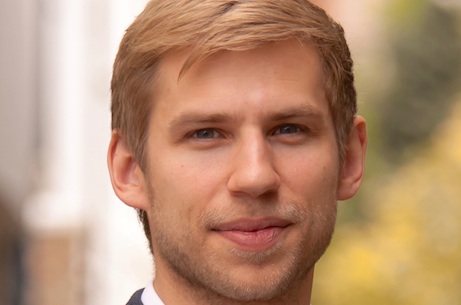
Noah Isserman has been appointed director of a US university initiative to promote social innovation.
A Gates Cambridge Scholar has been appointed director of a US university initiative to promote social innovation.
Noah Isserman [2008] will take up the first assistant professorship at the University of Illinois to cross the departments of Business Administration and Social Work.
The role involves facilitating and directing the creation of a new, University-wide initiative in social innovation. The aim is to increase the social value created by the University’s teaching, research and social entrepreneurship. This work follows on from his research into innovative funding mechanisms for civil society — including a just-released report on his research in Scotland, which has been hailed as a major contribution to research in venture philanthropy.
Noah says of the appointment: “I am tremendously excited to join the faculty of a world-class university, especially in such an unusual role. The University of Illinois already produces massive social value, which is a central part of its mission.”
“But to get to spend much of my time directing — which really means facilitating — a top-level effort to help the excellent units of the university create even more research, education, and products of consequence is really a phenomenal privilege.”
Noah’s PhD in Geography examined the financing, specifically the provision of growth capital and support to charities and social businesses. In particular, he researches “venture philanthropy”, a high-engagement form of philanthropy that is explicitly based on venture capital concepts and practices. His main focus is the increasing interaction between governments, foundations and private firms and the implications of those interactions for the future of social goods.
Venture philanthropy
Some of Noah’s research findings were released this week in Edinburgh. The report, authored by Noah, highlighted an emerging financing model in Scotland. John Kingston OBE, Chair of both the Association of Charitable Foundations and the European Venture Philanthropy Association, wrote: “This report should help all of us concerned with maximising impact – whether on individual lives, or by testing a model and/or systemically. As an independent evaluation, I welcome it. As a contribution to learning more of venture philanthropy… I commend it to you.” The report has already been covered or commented on by major foundations and the Scottish Finance Minister, and is the focus of an upcoming feature in Scotland’s leading politics and economics magazine, Holyrood.
The interaction between research and practice has been a hallmark of Noah’s work. His most recent funding, for example, comes from NASA and focuses on the financing of “planetary defence” and the harvesting of asteroids. “It’s really the same sort of issue that I worked on in my PhD and other work: entrepreneurship, financing, incentives, and a social goal. In this case, the social goal is non-extinction,” he says.
While he was at the University of Cambridge, Noah advised or worked on civil society issues in Pakistan, Kosovo, China, Uganda and the US. In the world of entrepreneurship, he sold an economic data firm to a think tank in 2012 and recently joined the Council of LAUNCH, a global initiative of NASA, USAID, the US State Department and Nike, which aims to identify and support innovative enterprises that might contribute to a sustainable future and meet urgent challenges facing the world.
Visiting lecturer
There is a personal side to Noah’s new post at the University of Illinois. He first began working with the University as a visiting lecturer when he was home for family reasons. “My dad, Andy Isserman, was a prof at Illinois and a fantastic man and educator. I spent six months at home with my family after he died unexpectedly playing basketball in 2010.”
“While I was taking care of family, I was lucky to get to teach a course as a visiting lecturer, which snowballed into a strategy role and broader conversations about the role of our great public universities in improving our world. It feels like a fitting path, really, to teaching and building things of consequence.”
Noah, who also did his MPhil at Cambridge with the support of a Gates Cambridge Scholarship, says that his greatest inspiration during his studies has been the Gates Cambridge community. He says: “The Gates community has been by far the defining and most valuable aspect of my experience, and several Gates scholars have been involved in my research, lecturing and advisory work so far.”
He also credits the Gates family for helping him choose his topic area and career path. “In my first year, I got to present my work to Bill Gates, Sr. at a symposium and get his feedback. When Bill and Melinda visited in 2010, I was able to speak with each of them. And when they both tell you you’re doing work that needs doing and you work on philanthropic finance, well, that’s about the best source of inspiration around.”












